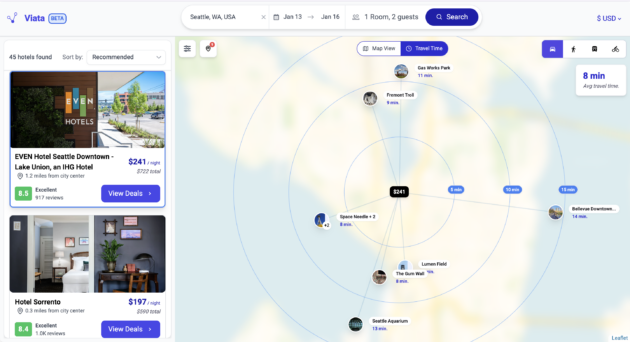A mom and son with tech roots at the University of Washington launch trip-mapping startup
When I was searching for a hotel earlier this year for a volleyball tournament, I could easily find information on lodging prices, ratings and availability. What I needed to know was how long the drive would be going to and from the venue over a long weekend.
Seattle startup Viata has that information, and just launched its platform for public use.
Viata lets users enter the city they’re visiting, sites and destinations for their trip, and then generates a map plotting potential hotel options and travel times between lodging and locations. Users can select whether they want to get around via car, mass transit, bikes or walking.
Ken Aragon, Viata’s co-founder and CEO, said this is an essential but harder to research parameter for making a hotel choice.
“There is no way when you’re looking for a hotel to understand, ‘How is this going to fit into my trip?” Aragon said.
In my case, I wound up mucking around in Google Maps, pasting in the tournament venue and multiple hotel options to answer the question.
Aragon founded Viata last year with his mom, Cecilia Aragon. The two have strong ties to the University of Washington. Ken holds a bachelor’s degree in computer science from the university, and Cecilia is a professor in the UW’s Department of Human Centered Design and Engineering.
Professor Aragon developed the mapping visualization tool in her lab, and she has two patents and two publications covering the work. The company is pursuing an exclusive license to use the technology.

The startup founders initially thought of using the mapping tech for real estate listings, then realized the potential for travel insights and made a pivot. Ken Aragon explained that travelers often prioritize finding the cheapest hotel option, but if it’s a longer way from their points of interest that could increase taxi and other travel fares.
“We want to visualize that so they can really easily see the hidden cost in transportation and avoid making bad decisions,” he said.
The startup recently won a $100,000 grant from the Washington Research Foundation to help commercialize the technology.
Viata is partnering with Seattle travel giant Expedia and has incorporated its 500,000 properties worldwide into the platform. The startup will make money through a revenue sharing model when a user books through one of their partner sites, such as Expedia or Hotels.com. The team plans to pursue a pre-seed round in the near future.
Viata is working out of the UW’s CoMotion Lab tech incubator in Startup Hall on the university’s campus. Ken Aragon said the incubator has been a great help in customer discovery and connecting with investors.
The startup’s other team members are Chingiz Torobekov, chief product officer and MBA grad from the UW, and founding engineer Eli Goldberg.
Company advisors are Dorine Rassaian, who spent nearly a decade leading product and marketing at Expedia, and Ryan Lee, an entrepreneur who founded the commerce platform Nautical Commerce.
Aragon said he likes working with his mom, who is also the company’s chief technologist.
“One of the most critical factors in a co-founder is trust, right?” Aragon said. “And when you’ve known your co-founder for literally your entire life, that foundation is as rock solid as it possibly could be.”

